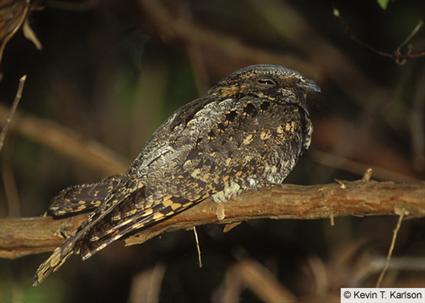2011 marks the second year of Bird Studies Canada’s Ontario Whip-poor-will Project. The goal of this 5-year project is to increase understanding of the current distribution and abundance of the Eastern Whip-poor-will in Ontario. As with many other aerial-foraging insectivorous birds, breeding bird surveys and atlas projects indicate that Eastern Whip-poor-will populations in eastern Canada have been declining since the 1980s. The Eastern Whip-poor-will is designated as Threatened in Ontario and Canada.
Last year, over 120 volunteers participated in the first year of the project and provided valuable data on more than 500 locations where they heard one or more whip-poor-wills calling. In addition, the Central Ontario roadside surveys identified several hundred stops where Eastern Whip-poor-wills were not calling at the peak breeding season – this negative data is important for identifying habitats that are not been used by the species.
Eastern Whip-poor-wills are now back on their breeding territories and we have already received several observation reports from last year’s participants. The peak period for hearing the iconic call of the Eastern Whip-poor-will is coming up soon, as this crepuscular species calls most frequently on bright moonlit nights in June. In June 2011, the full moon is on the 15th so the prime survey window for the Central Ontario Eastern Whip-poor-will roadside surveys is June 8 through 15. Bird Studies Canada is again seeking volunteers to survey Central Ontario owl survey routes after sunset during the June 8-15 period.
A simple online form is now available for reporting the location of any Eastern Whip-poor-will you hear in Ontario this summer. View the survey map to see locations in Central Ontario where road side surveyors are needed. To register for the roadside survey please contact Kathy Jones, Ontario Volunteer Coordinator, at volunteer@birdscanada.org. Find out more about this project.
Source: Bird Studies Canada



